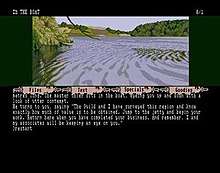The Guild of Thieves
- You may be looking for Thieves' Guild.
| The Guild of Thieves | |
|---|---|
.jpg) ZX Spectrum cover art for The Guild of Thieves | |
| Developer(s) | Magnetic Scrolls |
| Publisher(s) | Rainbird Software |
| Designer(s) | Rob Steggles |
| Platform(s) | Amiga, Amstrad CPC, Amstrad PCW, Apple II, Acorn Archimedes, Atari ST, Atari 8-bit, Commodore 64, MS-DOS, Apple Macintosh, Sinclair Spectrum[1] |
| Release | 1987 |
| Genre(s) | Interactive fiction |
| Mode(s) | Single-player |
The Guild of Thieves is an interactive fiction game by Magnetic Scrolls first published by Rainbird in 1987. The game also takes place in Kerovnia like the previous game The Pawn.

Gameplay
The player's character is "an aspiring member of the infamous Guild of Thieves" and is to steal all the valuables that can be found in and around an island castle. The game features "extremely atmospheric"[2] descriptions and 30 artistic renditions of key locations. Included in the game package are a faux newsletter of the Guild of Thieves titled What Burglar providing instructions and hints for the game, a Bank of Kerovnia Trading Account Card, a guild contract detailing the arrangement between the player's character and the Guild of Thieves and small dice.
History
The game was re-released in 1992 as part of the Magnetic Scrolls Collection.[3] The new version had an updated UI and came with an art poster depicting the island.
Source code recovery
In June 2017 Magnetic Scrolls successfully recovered the source code of The Guild of Thieves (and other games) to remaster and re-release them.[4][5]In December 2017 the remastered and enhanced edition of the game was published.[6]
Reception
| Reception | ||||||
|---|---|---|---|---|---|---|
| ||||||
The game was voted Best Adventure Game Of The Year at the Golden Joystick Awards.[7]
Dragon complimented the game, calling it an "exciting sequel" to The Pawn, citing its "witty dialogue, outstanding graphics, wry humor, and challenging puzzles".[8] Computer Gaming World in 1988 approved of the game's sophisticated parser, British humor, and high-quality graphics. It concluded, "the game must be highly recommended and it is tough ... it compares well with the best of Infocom".[9] The magazine's Charles Ardai in 1992 called its puzzles "pretty good, requiring a certain amount of ingenuity ... None are particularly memorable, though. The game is good, but lacks the sparks of innovation that would elevate it above the level of dozens of similar games".[3]
Antic stated "The outstanding graphics of The Pawn are matched by those in Guild of Thieves. High-resolution pictures transport you into a medieval world of thieves, castles and treasure. The only complaint I have about the Atari XE/XL version is that most of the detailed graphics had only shades of one or two colors."[10]
References
- ↑ Meier, Stefan. "Magnetic Scrolls Fact Sheet". Retrieved 17 June 2015.
- 1 2 "Adventure Trail", CRASH, Newsfield Publications (51): 42–43, April 1988, archived from the original on 1999-01-01
- 1 2 Ardai, Charles (November 1992). "Virgin Software's Magnetic Scrolls Collection". Computer Gaming World. pp. 64–64. Retrieved 4 July 2014.
- ↑ Dev rescues '80s text adventure source code by baking tapes in an oven on Gamasutra.com by Alex Wawro (June 28, 2017)
- ↑ Magnetic Scrolls Original Games Source Code Recovered! on strandgames.com (June 19, 2017)
- ↑ "The Guild of Thieves by Magnetic Scrolls Restored". strandgames.com. Retrieved 2017-12-23.
- ↑ "Golden Joystick Awards 1988". Computer and Video Games. Future Publishing (79): 39. May 1988.
- ↑ Lesser, Hartley; Lesser, Patricia; Lesser, Kirk (November 1987). "The Role of Computers". Dragon (127): 74–80.
- ↑ Roberts, Alan (February 1988). "Guild of Thieves". Computer Gaming World. p. 38. Retrieved 2 November 2013.
- ↑ Manor, John (May 1988). "Product Reviews". Antic. Vol. 7 no. 1.
External links
- The Guild of Thieves at MobyGames
- The Guild of Thieves at Lemon 64
- The Guild of Thieves at SpectrumComputing.co.uk
- The Guild of Thieves at the Magnetic Scrolls Memorial